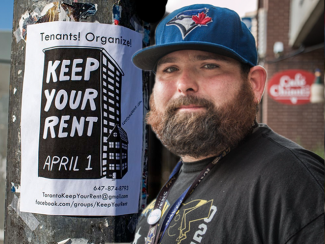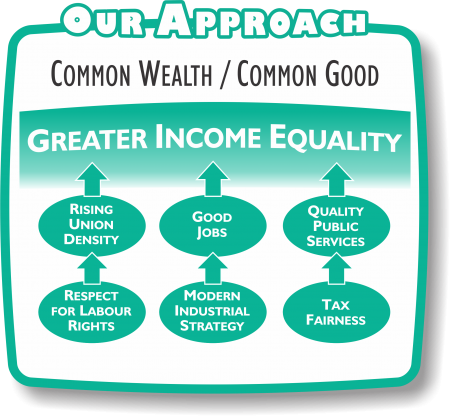JILTED
Workers left in the lurch; banks and big business come first

IT’S CLEAR WHO OUR POLITICIANS LIKE MOST. It’s not us. All us everyday working folks have been jilted for the banks and big business.
On April 1 the federal COVID-19 bailout package totaled at least $655 billion. Banks and big business will suck up well over $570 billion of it. Everyday folks will get a lot less.
The CERB (Canada Emergency Response Benefit) may pay out as much as $24 billion; and workers can expect some direct payouts from the $71 billion going to provide wage subsidies to employers. But that still leaves the banks and big business set to get three to four times as much as the rest of us.
As of April 1 the total federal COVID-19 financial aid package looked like this:
- $3 billion for protecting health and safety
- $105 billion for direct support measures (CERB, Wage subsidies, etc )
- $85 billion fort CRA/CBSA liquidity support
- $570 billion + for Business Credit Availability Program (BCAP) & other credit and liquidity support
*** GRAND TOTAL $655 BILLION + ***
“I can only survive for a month”
The federal government says the online portal to apply for the $2000 a month CERB will be available in early April, and people can expect payments within 10 days. CERB payments will be issued every four weeks, and will be available from March 15, 2020 to Oct. 3, 2020
“The money from CERB and the wage subsidies is not nothing,” says George St. Amour, a barista in Wolfville, Nova Scotia. “But it is not everything either. A lot of us live on a very thin line. The constant worry about having enough to get by isn’t going to go away.”
“I think this wage subsidy is a bailout for businesses, because ultimately they will have all the power,” said Zailda Chan, with UNITE HERE Local 40 in Vancouver. “They’ll have the power of whether or not to bring people back and how many people to bring back.”
She explained 90 per cent of her members have already been laid off from places such as hotels, restaurants, and airports, and any wage subsidy isn’t going to help those who work part-time or in the gig economy.
Instead, the union wants to see an 80 per cent wage replacement, which would take effect immediately and include income gained through tips.
“My biggest worry is my rent,” said a self-employed makeup artist who has lost all of her contracts. “I’ve recently had to email my landlord telling him about my situation. I can only survive for a month on what I have now.” Asked about the government’s support measures, she added, “It doesn’t give me much reassurance.”
A rent freeze, free rent
ACORN Canada, an organization for low-income families wants Ottawa to implement a national rent freeze as well as a temporary rent-free period for the poorest 50 percent of tenants. As of April 2, nearly 800,000 people had signed the “Cancel rent and mortgage payments during Covid-19” petition on change.org.
Sarah Dillon has closed up her small coffee shop in Toronto. She’s both a commercial and home renter. She says: “A rent freeze would allow me to at least get through the month and see a possibility of surviving this.”
“The fact that there is a freeze on mortgage payments allows homeowners and property owners and landlords to accumulate rent from us, while they incur no fees or interest. It’s discriminatory towards the working class, towards small businesses,” she said.
Spontaneous rent strike?
Toronto resident Bryan Doherty says there’s no way he will make his April rent. He’s a carpenter who has been “out of work for a bit. March has been pretty rough for a lot of people. This is essentially a tipping point.”
Doherty says he’s not counting on politicians to make the call. He thinks it’s time for a national rent strike. He’s encouraging his neighbours and anyone who is having financial trouble, to withhold this month’s rent.
“We should come together and take care of each other. I’m worried about tens of thousands of my neighbours and it either being impossible for them to make rent or dangerous for them to give away that much money under these circumstances,” he said.
“There’s no shame in not paying rent now and we shouldn’t necessarily wait for consent from the politicians or the landlords.”
Too many cracks to fall between
The CERB is being organized through the Canada Revenue Agency, which means you’ll need to have an online account with them or access to the internet to create one. This could prove problematic for most our most vulnerable.
Another concern is how soon folks will get money in their hands. The CERB will only be open for applications on April 6. Electronic transfers will get money to people in a few days. But anyone who receives it by mail can expect to wait another 10 days at least.
The top-up to the child benefit will only be paid out in May.
Most working people just can’t wait that long—especially the estimated 1.7 million workers in the so-called “gig economy.” Most will have run out of money by the end of March, with no way to bridge the gap until the government money arrives.
The government could, if it wanted to, pay a basic income of $1,000 per week for six months to the four million Canadians it expects to require emergency assistance for a total of $104 billion—no where near its total bailout for the financial sector.
A guaranteed income like this would not force workers to risk going back to work too soon. It would enable everyone, including gig economy workers, to focus on what is most important right now: reducing social contact so that the healthcare system has the best chance of coping with the coronavirus pandemic.
- 30 -



Add new comment